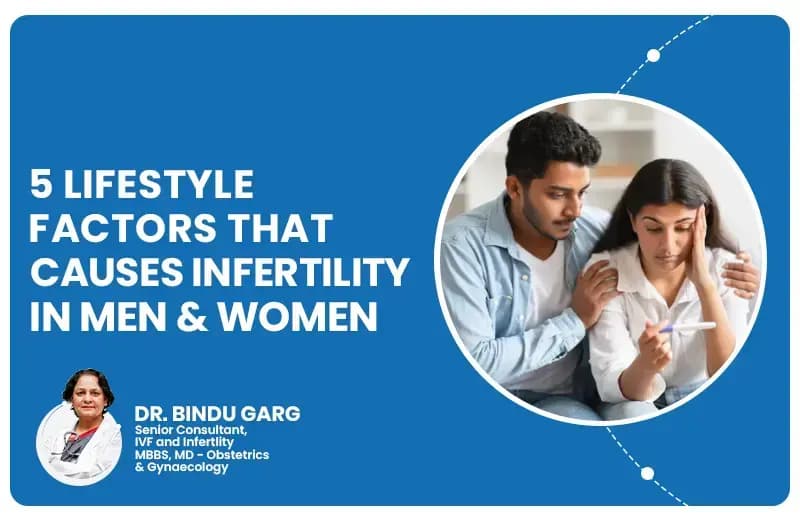
5 Lifestyle Factors That Cause Infertility in Men And Women
When we talk about lifestyle factors that cause infertility, we talk about everyday habits like what we eat, how active we are, how we handle stress, and even things like smoking and drinking. These factors affect our reproductive health, making it difficult to conceive.
These things seem very normal to many people, but it is important to bring attention to their fertility problems. By understanding how our lifestyle can affect fertility, we can take proactive steps to improve our chances of starting a family.
In this article, we'll explore some common lifestyle factors that can contribute to infertility in both men and women. From diet and exercise to stress management and more, we'll explain in simple terms so everyone can understand the importance of making healthy choices for fertility.
1. Diet
Diet is essential in fertility-related problems. What we eat can affect our reproductive health in many ways. Therefore, it is important for individuals and couples trying to conceive to eat a balanced diet rich in nutrients while avoiding unhealthy foods. Making healthy dietary choices improves your chances of successful conception and helps in overall reproductive health.
What should we Eat to maintain or improve fertility health?
A diet rich in essential nutrients such as fruits, vegetables, and low-fat proteins impacts fertility problems. These nutrients are important for hormone regulation and overall reproductive function.
What should we avoid to maintain or improve fertility health?
Excessive eating of junk food, sugary snacks, and caffeine also hurts fertility. These unhealthy foods increase weight gain (which increases hormonal imbalance), which creates a negative impact on conception.
2. Exercise
Exercise is generally good for our health, but too much exercise can sometimes affect fertility. When we put too much stress on our bodies, it can mess with our reproductive hormones, making it harder to conceive. However, you should still attend the gym! Daily exercise, like brisk walking, cycling, or doing yoga is really good for fertility. It helps keep our bodies healthy and balanced, which is important for getting pregnant.
So, the main thing is to find the right balance.
A healthy advice for you
You should aim to exercise for about 30 minutes a day. If you're trying to conceive and you're concerned about your exercise routine, it's a good idea to talk to your doctor. They can help you find the right balance of exercise that supports your fertility goals. Remember, 30-minute exercise can help make you healthier and give you a better chance of starting a family.
3. Stress Management
When you're stressed, your body releases hormones like cortisol and adrenaline, which can disturb the balance needed for reproductive processes. It interferes with ovulation in women and sperm production in men, making it difficult for both to conceive.
Stress can also affect behaviors that affect fertility, such as sleep patterns, eating habits, and sexual activity. Stress can also reduce sexual desire, which makes couples less likely to engage in intercourse during the fertile period.
Other than this, stress can contribute to conditions that affect fertility, such as polycystic ovary syndrome (PCOS) in women or erectile dysfunction in men. It can also make existing reproductive health problems worse, which makes it more challenging to conceive.
What should you do to manage stress?
However, it's important to know that not all stress factors affect infertility in the same way, and everyone's stressors are different. However, reducing stress will not guarantee pregnancy. Managing stress through techniques such as relaxation, exercise, counseling or lifestyle changes can help improve overall health and increase your chances of conceiving.
4. Alcohol Consumption
When you drink alcohol, it can affect the hormonal balance in your body, which is essential for reproduction. This can make it harder for couples to conceive.
In men, alcohol can reduce testosterone levels and affect sperm quality and quantity.
For women, drinking alcohol affects the menstrual cycle and interferes with ovulation, making it more difficult to get pregnant.
If a woman is pregnant, alcohol can also increase the risk of miscarriage and birth defects. It's also important to know that the effects of alcohol on fertility can vary depending on how much and how often you drink.
What should you do in case you are consuming alcohol?
If you're trying to conceive, it's a good idea to limit alcohol consumption or avoid it. Healthy lifestyle choices, such as maintaining a balanced diet and exercising regularly, can also improve fertility. If you're concerned about how alcohol may be affecting your fertility, it's best to consult with a fertility expert for personalized advice and support.
5. Smoking
Like the other reasons we discussed above, smoking also greatly affects fertility. Both men and women who smoke may experience difficulties conceiving.
In men, smoking can reduce sperm count, reduce sperm motility, and cause abnormal sperm shape, making it harder to fertilize an egg.
In women, smoking can damage eggs and affect hormone levels, which makes it more challenging to conceive. Smoking during pregnancy also increases the risk of miscarriage, ectopic pregnancy, premature birth, and low birth weight.
Exposure to smoking is also harmful and can affect fertility for both partners. Quitting smoking is important to improve reproductive outcomes and overall reproductive health.
6. Conclusion
In conclusion, lifestyle factors play an important role in men's and women's fertility. Diet, exercise, stress management, alcohol consumption, smoking, and choices related to contraception can all affect the ability to conceive. Adopting a balanced diet, getting daily exercise, managing stress effectively, limiting alcohol intake, quitting smoking, and choosing contraception wisely are important steps to help optimize fertility.
When lifestyle changes can improve your chances of conceiving, it is important to remember that individual & couple situations are different. It is essential for people wishing to increase their fertility and start a family to consult a fertility specialist for personalized advice and support.
Content Created By:

CyberBizz Technologies
Team - Content Curator